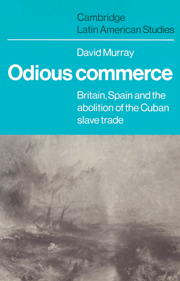Book contents
- Frontmatter
- Contents
- Tables
- Preface
- 1 The ‘opening’ of a legal trade
- 2 Parliament versus Cortes
- 3 Legality and illegality
- 4 The treaty of 1817
- 5 Enforcement and re-enforcement: the attempt to make the slave trade prohibition effective
- 6 The treaty of 1835
- 7 An abolitionist era
- 8 The Turnbull affair
- 9 The Escalera conspiracy
- 10 The penal law of 1845
- 11 Free trade and annexationism
- 12 The failure of the penal law
- 13 A new class of slaves
- 14 The abolition of the Cuban slave trade
- Abbreviations
- Notes
- Bibliography
- Index
- CAMBRIDGE LATIN AMERICAN STUDIES
10 - The penal law of 1845
Published online by Cambridge University Press: 16 October 2009
- Frontmatter
- Contents
- Tables
- Preface
- 1 The ‘opening’ of a legal trade
- 2 Parliament versus Cortes
- 3 Legality and illegality
- 4 The treaty of 1817
- 5 Enforcement and re-enforcement: the attempt to make the slave trade prohibition effective
- 6 The treaty of 1835
- 7 An abolitionist era
- 8 The Turnbull affair
- 9 The Escalera conspiracy
- 10 The penal law of 1845
- 11 Free trade and annexationism
- 12 The failure of the penal law
- 13 A new class of slaves
- 14 The abolition of the Cuban slave trade
- Abbreviations
- Notes
- Bibliography
- Index
- CAMBRIDGE LATIN AMERICAN STUDIES
Summary
In the treaty she signed with Britain in 1835, Spain contracted to pass legislation to end the African slave trade to her Caribbean colonies. Britain, as the other party to the treaty, had a natural interest in ensuring the fulfilment of Spain's contract. When it became clear as early as 1836 that the Havana authorities had succeeded in blunting the impact of the new treaty in Cuba, what had been originally a subsidiary part of the main structure of slave trade suppression now became, in British eyes, at least as important as the treaty itself. Spanish co-operation was imperative if the slave trade to Cuba was to be stopped. The passage of Spanish legislation would be a tangible demonstration of this co-operation and a definite signal to the Cuban planters that the metropolis was determined to stamp out the slave trade. Little did the British government realize when it reminded Spain of her obligation to promulgate a penal law, two months after the ratification of the treaty, that nine more years would pass before the law would finally appear and that its provisions actually would protect instead of prosecute the slave traders of Cuba.
After the British reminder, an investigation, ordered by the Spanish Foreign Minister, discovered that steps had indeed been taken to fulfil Spain's contracted promise. Civil servants had drafted a law which had been laid before the upper chamber of the Spanish Parliament in December 1835. A commission of three distinguished Spanish jurists, headed by Martínez de la Rosa who had negotiated and signed the slave trade treaty for Spain, had gone over the draft proposal before it went to the legislature.
- Type
- Chapter
- Information
- Odious CommerceBritain, Spain and the Abolition of the Cuban Slave Trade, pp. 181 - 207Publisher: Cambridge University PressPrint publication year: 1981

